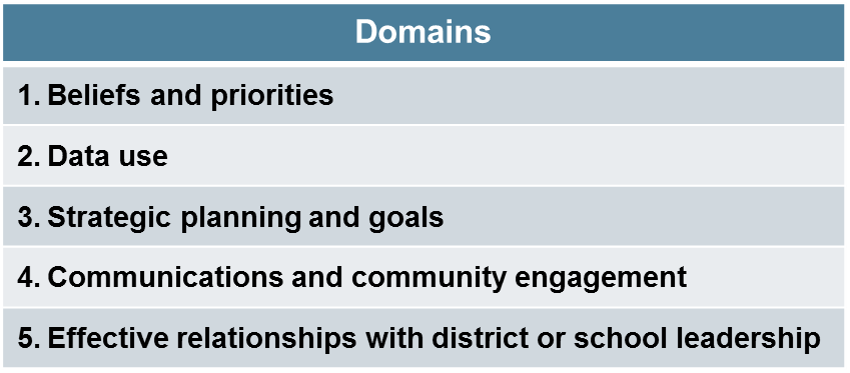This post is part of a series about Bellwether’s recent work on school governance and school board effectiveness.
The members of elected and appointed school boards play an important role in governing schools and allocating resources. But beyond these practical responsibilities, a growing body of research suggests that what school board members believe, know, and do can set the conditions for effective classroom instruction and higher levels of student achievement.
For some recent projects, Bellwether reviewed the evidence base on school board effectiveness. Research indicates that effective school boards focus on student learning, make decisions informed by data, and build strong relationships with leadership and the community. Based on this evidence, important practices for effective school boards emerge across five domains.

- Beliefs and priorities: Research shows that it is important for boards to hold beliefs and priorities that focus on student learning rather than school management. In addition, a 2006 meta-analysis of 27 studies found that districts with higher levels of student achievement had boards, districts, and schools that were clearly aligned in their efforts to support non-negotiable goals. This further underscores that it is important for boards to clearly codify their beliefs and priorities.
- Data use: Boards in districts experiencing academic improvement tend to use more data more often to inform their decisions. For example, a notable study by the Iowa Association of School Boards found that board members in improving districts received data about exemplary programs and practices, test scores, dropout rates, and other measures on a regular basis from superintendents, curriculum directors, principals, and teachers, as well as sources outside the district.
- Strategic planning and goals: Effective boards craft strategic plans that are clear and reflect district and community input, and they hold themselves accountable for meeting goals and improving student learning. For example, a study of 10 school boards in British Columbia found that boards in districts with higher levels of student achievement and lower costs were more knowledgeable about district programs and practices and had a clearer sense of their goals. In addition, these districts shared firm values and beliefs about students and learning, and also deliberately articulated and discussed these values and beliefs among themselves and with their communities, suggesting that strategic planning must work in concert with board practices in other domains in order to be most effective.
- Communications and community engagement: Research has found that effective boards often have strong community partnerships and cooperative relationships between staff and the community. They also have strong structures in place to ensure clear communication with stakeholders like teachers, parents, and the media. In addition, case studies of school boards from the U.S. Chamber of Commerce Foundation found that business leaders, in particular, can play a critical role in supporting effective school board governance and reforms that improve student achievement.
- Effective relationships with district or school leadership: Strong working relationships between school boards and superintendents are important for district and student success. For example, a study of 10 districts across five states found that “strong, collaborative leadership by local school boards and school superintendents is a key cornerstone of the foundation for high student achievement,” and a study of Texas school districts suggests that there is a link between improved student achievement and high levels of trust between the superintendent and school board. Additionally, multiple studies have shown that stable leadership is correlated positively with student achievement. However, research from the Brookings Institution found that superintendents have relatively little influence on student achievement, and that student achievement does not improve with the longevity of superintendent service, suggesting that some turnover among board members and superintendents may be healthy and lead to more effective policies.
Research shows that effective school boards can play an important role in overall school quality. This research has informed Bellwether’s recent work, including developing a framework for evaluating school board effectiveness with Colorado Succeeds, as well as surveying school board members in Washington, DC and Rhode Island. As they look for ways to improve student learning, districts and charters alike should ensure that school boards are using effective practices and prioritize supplying adequate training and support for board members.